Tackling the Everest Base Camp trek is a once-in-a-lifetime adventure that captivates the hearts of outdoor enthusiasts worldwide. This iconic journey through the majestic Himalayas offers a unique opportunity to take in the rich Sherpa culture, witness awe-inspiring landscapes, and stand in the shadow of the world’s highest peak. While the trek presents a moderate challenge, the professional guidance, comprehensive safety measures, and breathtaking vistas make it an experience that leaves a lasting impression. But the true allure of this trek lies in the personal journey, as adventurers push their limits, connect with nature, and return with memories that will forever shape their perspectives.
Key Points
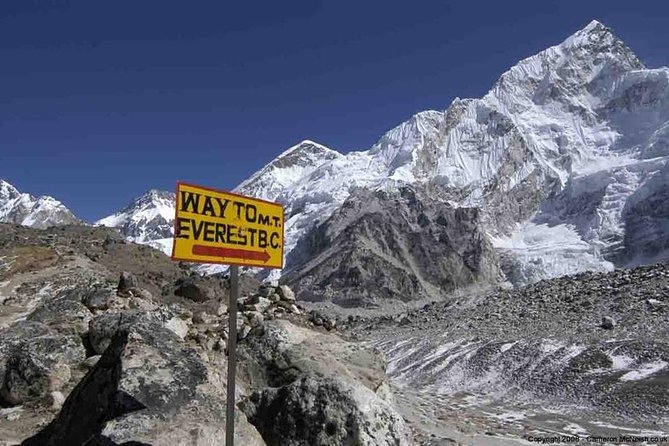
- The Everest Base Camp Trek is a highly rated 12-14 day trekking experience with a starting price of $2,599 per person.
- The trek includes a professional mountain guide, permits, flights, accommodation, travel insurance, and porter services.
- Participants must have a moderate fitness level and disclose any pre-existing medical conditions before the trek.
- The trek covers over 60 miles through rugged terrain at high altitudes, requiring proper acclimatization and preparation.
- Past participants have provided overwhelmingly positive reviews, praising the knowledgeable guides and breathtaking Himalayan scenery.
Overview and Pricing
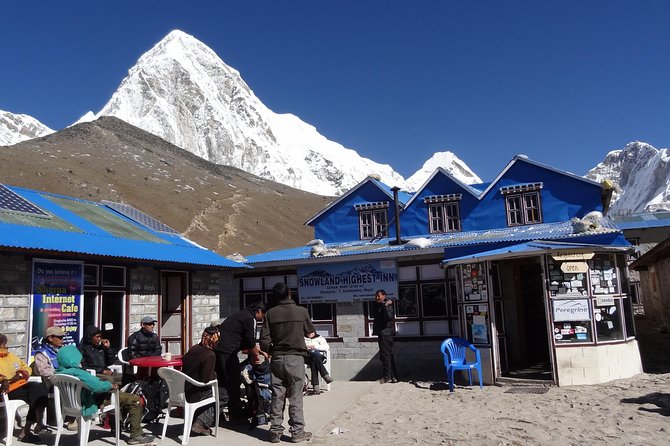
The Everest Base Camp Trekking experience offers an unparalleled opportunity for adventurous travelers to embark on a journey to the legendary base camp of the world’s highest mountain.
Rated 5.0 out of 5 stars by previous participants, this trekking package is priced from $2,599 per person, with the final cost varying depending on group size.
The package includes a mountain guide, necessary permits, flights to and from Lukla, accommodation during the trek, travel insurance, medical evacuation, and porter services.
Travelers should note the moderate physical fitness level required and the exclusion of those with certain medical conditions.
The trek starts at 8:45 AM, with pickup available from the traveler’s hotel.
Ready to hit more trails? More hiking adventures we feature in Kathmandu
Inclusions
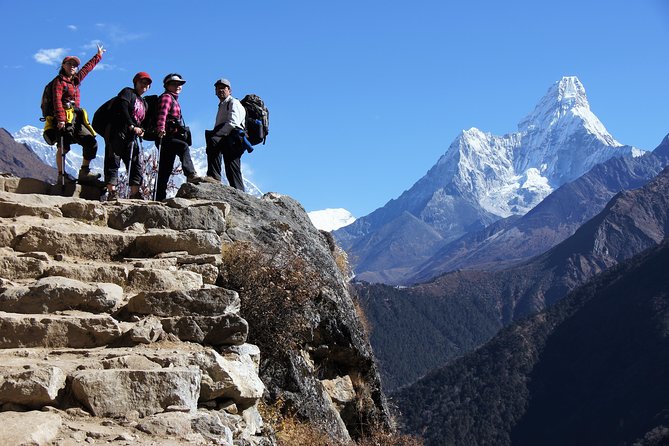
The Everest Base Camp Trekking package includes several key components to ensure a seamless and well-supported experience for participants. A professional mountain guide accompanies the group, providing expertise and leading the way.
All necessary permits are secured, and flights to and from the starting point in Lukla are included. Accommodation and meals during the trek are provided, along with travel insurance and medical evacuation coverage in case of emergencies.
A porter service is available to carry participants’ belongings, and you will also receive personal spending money.
These comprehensive inclusions aim to create an enjoyable and worry-free trekking adventure to Everest Base Camp.
Meeting and Pickup
Pickup is available from participants’ hotels, with the tour starting at 8:45 AM.
This allows for a convenient and efficient start to the Everest Base Camp trekking experience. Travelers are encouraged to be ready and waiting at their hotel lobby, as the tour guides will arrive promptly to collect the group.
The early morning start time ensures ample time to reach the starting point and begin the trek, maximizing the day’s activities.
This meeting and pickup arrangement streamlines the process, ensuring a smooth and organized commencement to the unforgettable journey ahead.
Health and Accessibility Requirements
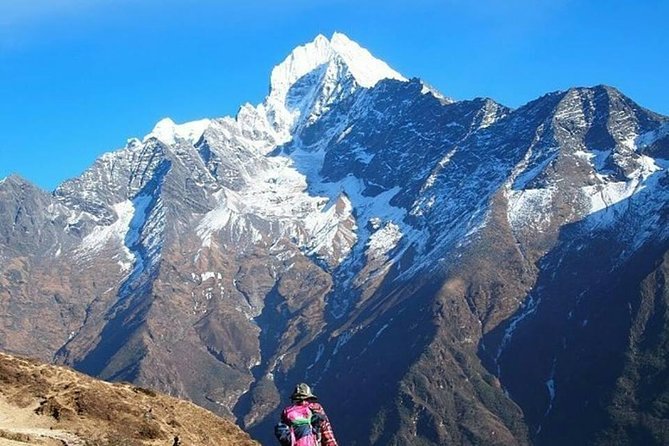
Travelers must meet certain health and accessibility requirements to participate in the Everest Base Camp trekking experience. The trek isn’t recommended for those with back problems, heart issues, or serious medical conditions.
Plus, it isn’t wheelchair accessible and not suitable for pregnant travelers. A moderate physical fitness level is required to complete the challenging hike.
To ensure a safe and enjoyable journey, participants must:
- Be in good overall health and physical condition.
- Disclose any pre-existing medical conditions to the tour provider.
- Understand the risks involved and be prepared for the demanding nature of the trek.
Trekking Difficulty and Preparation
Trekking to Everest Base Camp presents a significant physical challenge, requiring a high level of preparation and fitness. The trek covers over 60 miles through rugged mountain terrain, with altitudes reaching over 18,000 feet.
Trekkers must be prepared to hike for 6-8 hours per day, often at steep inclines. Proper acclimatization to the high altitude is essential to avoid altitude sickness. Hikers should have previous experience with multi-day treks and be able to carry a daypack weighing up to 15 pounds.
Comprehensive training, including cardiovascular exercise and strength training, is recommended in the months leading up to the trek. Proper gear, including warm clothing, sturdy hiking boots, and trekking poles, is also crucial for a successful and safe journey to Everest Base Camp.
- Everest Base Camp Helicopter Tour Stop at Everest View Hotel
- Private Kathmandu Sightseeing Tour – UNESCO World Heritage Sites
- Everest Base Camp Helicopter Tour Landing at Hotel Everest View
- 14-Day Private Annapurna Base Camp Trek
- Everest Base Camp Trek-12 Days
- 200 Hours Yoga Teacher Training at Nepal Yoga Home (Starts on 1st of Everymonth)
Itinerary and Highlights
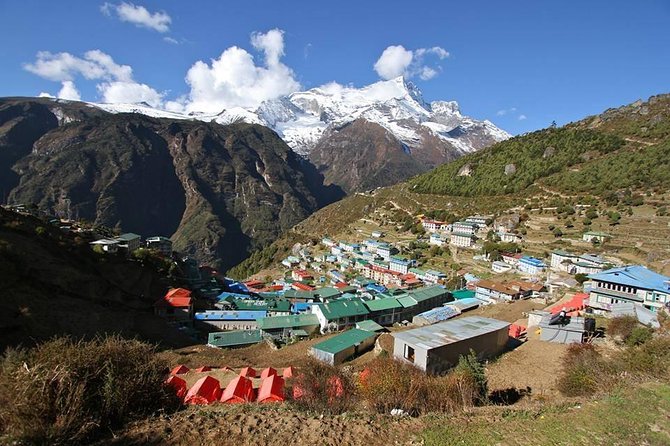
The Everest Base Camp trekking journey typically takes around 12-14 days, allowing ample time for acclimatization and exploration along the way.
Highlights of the trek include:
-
Witnessing the breathtaking Himalayan landscapes, including the awe-inspiring Khumbu Icefall and the majestic Everest itself.
-
Visiting Tengboche Monastery, a renowned Buddhist monastery with stunning views of the mountain range.
-
Experiencing the rich Sherpa culture, exploring traditional villages, and interacting with the friendly local communities.
The trekking route follows ancient trade paths, offering a glimpse into the historical significance of the region.
Participants will have the opportunity to savor the local cuisine, engage in cultural exchanges, and create lasting memories of their Everest Base Camp adventure.
Safety and Precautions
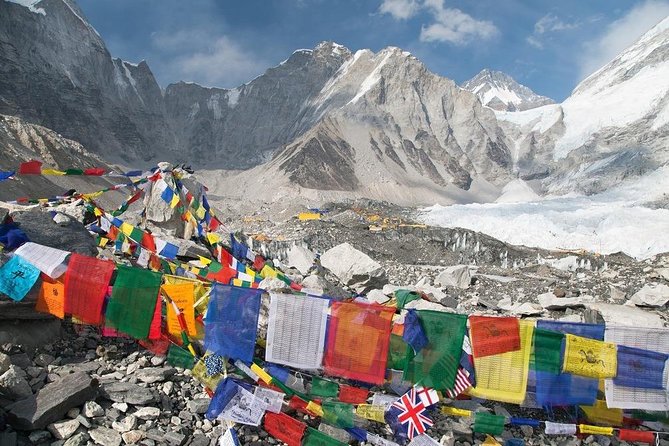
Although the Everest Base Camp trek is a remarkable experience, it’s crucial to prioritize safety and take necessary precautions. The trek isn’t recommended for those with certain medical conditions, as the high altitude can exacerbate existing issues.
Participants must have a moderate level of physical fitness to handle the challenging terrain and long hours of hiking. Proper acclimatization is essential to avoid altitude sickness, and trekkers should be prepared to adjust their pace or shorten the itinerary if needed.
Plus, travel insurance with medical evacuation coverage is mandatory, ensuring access to prompt medical care in case of emergencies. By following safety guidelines and being mindful of individual limitations, trekkers can fully enjoy the breathtaking beauty of the Everest region while prioritizing their well-being.
Reviews and Testimonials
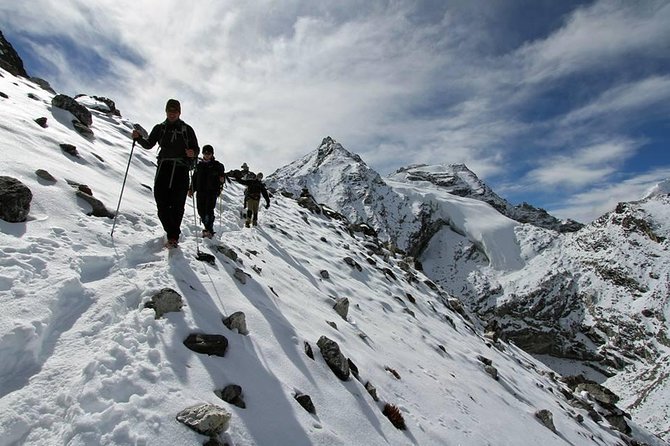
Overwhelmingly positive reviews from past participants underscore the exceptional quality of the Everest Base Camp trekking experience.
The tour boasts a perfect 5-star rating from a single review, a testament to its ability to exceed expectations.
Travelers rave about the:
- Knowledgeable and attentive guides who ensured a safe and enriching journey.
- Seamless organization, from airport transfers to accommodation and meals.
- Breathtaking scenery and the sense of accomplishment upon reaching the base camp.
With free cancellation and comprehensive inclusions, this trekking package offers unbeatable value for adventure-seeking travelers.
The moderate fitness requirement ensures a challenging yet rewarding experience for those up for the task.
Frequently Asked Questions
What Is the Best Time of Year to Trek to Everest Base Camp?
The best time to trek to Everest Base Camp is typically in the spring (April-May) or autumn (September-November) when weather conditions are milder and trekking is more comfortable. These seasons offer clear skies, moderate temperatures, and fewer crowds on the trails.
Can I Bring My Own Trekking Gear or Is It Provided?
Trekkers can bring their own trekking gear, but it’s also available for rent. The tour provider typically includes necessary gear like hiking boots, backpack, sleeping bag, and down jacket, though travelers are welcome to use their own equipment if preferred.
What Is the Typical Group Size for This Trekking Tour?
The typical group size for this trekking tour ranges from 6 to 16 participants, though the group size may vary depending on the specific dates and availability. Private tours are also offered for solo travelers or small groups.
Is It Possible to Customize the Itinerary for This Trek?
The tour operator allows travelers to customize the itinerary for this trek. They can adjust the pace, add or remove stops, and tailor the experience to their preferences, though additional fees may apply.
What Is the Level of Altitude Sickness Risk for This Trek?
The trek to Everest Base Camp has a moderate-to-high risk of altitude sickness due to the significant elevation gain. Trekkers should be in good physical condition and acclimatize slowly to reduce their chances of experiencing symptoms like headaches, nausea, or fatigue.
Recap
The Everest Base Camp trek is a life-changing adventure that combines stunning natural beauty with a unique culture. With professional guides, comprehensive safety measures, and a well-designed itinerary, this trek offers adventurers an unparalleled opportunity to challenge themselves and create lasting memories. Whether you’re seeking an adrenaline-filled journey or a chance to learn about the Himalayan way of life, the Everest Base Camp trek is an experience that will leave a lasting impression.
More Hiking & Trekking Tours in Kathmandu
More Tour Reviews in Kathmandu
Not for you? Here's more things to do in Kathmandu we have recnetly reviewed
- 2 Best Guided Tours In Jagat
- 20 Best 2 Day Tours In Kathmandu
- 20 Best 3 Day Tours In Kathmandu
- 20 Best 4 Day Tours In Kathmandu
- 8 Best Dining Experiences In Kathmandu
- 20 Best Full-Day Tours In Kathmandu
- 25 Best Helicopter Flights And Tours In Kathmandu
- 25 Best Helicopter Flights And Tours In Kathmandu
- 13 Best Massage And Relaxation Services In Kathmandu
- 5 Best Photography Experiences In Kathmandu
- 8 Best Dinner Tours In Kathmandu
- 17 Best Lunch Experiences In Kathmandu
